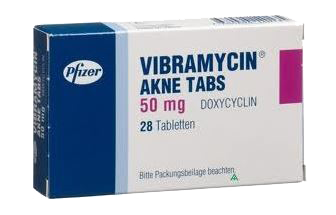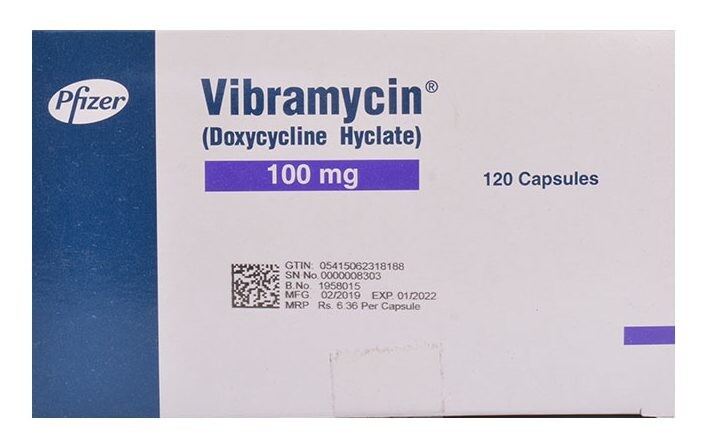Doxycycline

Dosages
Doxycycline 100 mg
| Quantity | Price per pill | Total price | |
|---|---|---|---|
| 10 | $4.00 | $40.00 | |
| 20 | $2.25 | $45.00 | |
| 30 | $1.67 | $50.00 | |
| 60 | $0.92 | $55.00 | |
| 90 | $0.67 | $60.00 | |
| 120 | $0.54 | $65.00 | |
| 180 | $0.42 | $75.00 | |
| 270 | $0.35 | $95.00 | |
| 360 | $0.29 | $105.00 |
Payment & Shipping
Your order is securely packed and usually ships within 24 hours. Below is what a standard package looks like.
It is about the size of a regular letter (9.4x4.3x0.3 inches) and shows no details about what is inside.



| Shipping Method | Estimated delivery |
|---|---|
| Express Free for orders over $300.00 | Estimated delivery to the U.S.: 4-7 days |
| Standard Free for orders over $200.00 | Estimated delivery to the U.S.: 14-21 days |









Discount Coupons
- Independence Day - July 4, 2026 10% JULY410
- Labor Day - September 7, 2026 7% LABOR07
- Thanksgiving - November 26, 2026 9% THANKS09
FAQ
Description
What Is Vibramycin, and How Is It Applied?
Doxycycline monohydrate is the active ingredient in Vibramycin. The antibiotic Vibramycin is a member of the tetracycline drug class. It is applied to numerous varieties of infections, such as:
- skin conditions like acne;
- eye infections;
- sexually transmitted diseases like gonorrhea, syphilis, and chlamydia;
- infections of the chest, lungs, or nasal passages, such as bronchitis, pneumonia, and sinusitis;
- urinary tract infections, which affect the passageways through which urine passes;
- fever brought on by tick or lice bites;
- malaria, in cases when chloroquine is ineffective.
Additionally, Vibramycin is used to stop the spread of illnesses, including leptospirosis (a bacterial infection), travelers' diarrhea, Rocky Mountain spotted fever, scrub typhus (a disease spread by tiny insects), and malaria.
Your doctor may prescribe Vibramycin to treat an infection that isn't on the list. You can also be prescribed an additional medication to take with Vibramycin. You need to see your doctor if your symptoms worsen or don't get better.

Things to Consider Before Taking Vibramycin
Avoid using Vibramycin in the following cases:
- If you are allergic to any other components, tetracycline antibiotics or doxycycline of this medication.
- If you are nursing a child or trying to get pregnant.
Vibramycin should not be used when teeth are developing, such as during pregnancy, infancy, or in children under the age of eight, as this could result in a yellow-gray-brown discoloration that is permanent.
In certain situations (such as severe or life-threatening illnesses), your doctor may determine that prescribing Vibramycin is the better option for children under the age of eight years old since the benefits outweigh the risks.
Safety Measures
Before taking Vibramycin, see your physician or pharmacist if any of the following situations apply to you:
- If you are going to be in the sun. When using this medication, you should stay out of the sunlight, as your skin may be more susceptible to sunburn than usual.
- You suffer from liver or renal issues.
- You suffer from myasthenia gravis, a condition that results in abnormal fatigue and weakness in some muscles, especially the eyelid.
- You suffer from systemic lupus erythematosus, an immune system illness that produces fever, rashes on the skin, and joint pain. Taking Vibramycin may make the condition worse.
- You suffer from porphyria, an uncommon blood pigment disorder.
- You have or have previously had systemic lupus erythematosus, an allergic disease that can cause fever, skin rashes, and joint pain.
- Vibramycin treatment may exacerbate this illness. You may have syphilis. When your treatment is finished, your doctor will still monitor you.
- You have diarrhea, frequently get diarrhea when taking antibiotics, or have experienced stomach or intestinal issues. Inform your doctor right away if you get severe, protracted, or bloody diarrhea while using Vibramycin, as the medication may need to be stopped. This could be an indication of pseudomembranous colitis, an inflammation of the intestines that can happen after antibiotic therapy.
- You are taking oral retinoids because taking them with Vibramycin increases the chance of developing elevated pressure in your skull, which can cause a severe headache and vision changes.
Long-term usage of Vibramycin can result in infections that are resistant to this medication. Your doctor might explain the symptoms and indicators of these kinds of infections.
Dosage
| Condition/Infection | Dosage | Length of Treatment |
|---|---|---|
| Chest, lung, nasal, urinary tract, eye, and other infections | 2 tablets on the first day, then 1 tablet daily | Dependent on the infection |
| Children 8-12 years (under 45 kg) | First day: 4.4 mg/kg (single or 2 divided doses), then 2.2 mg/kg from second day | Dependent on the infection |
| Children 8-12 years (over 45 kg) | Adult dose: 200 mg on first day, then 100 mg daily | Dependent on the infection |
| Adults and children 12-18 years | 200 mg on first day, then 100 mg daily | Dependent on the infection |
| Acne | Half tablet daily for 6-12 weeks, with food or drink | Dependent on response |
| Sexually Transmitted Diseases | 1 tablet twice daily for 7-10 days | Dependent on the infection |
| Primary and Secondary Syphilis | 2 tablets twice daily for 2 weeks | Monitoring after treatment |
| Fevers associated with louse or tick bites | Single dose of 1 or 2 tablets depending on severity | Dependent on response |
| Malaria (when chloroquine is not effective) | 2 tablets daily for at least 7 days | Dependent on the infection |
| Prevention of malaria | 1 tablet daily from 1-2 days before traveling to malarial area until 4 weeks after returning | Duration of travel and post-return |
| Prevention of scrub typhus | Single dose of 2 tablets | - |
| Prevention of travelers' diarrhea | 1 tablet twice daily on first day of travel, then 1 tablet daily throughout stay | If >21 days, consult doctor |
| Prevention of leptospirosis | 2 tablets once weekly during stay; 2 tablets on completion of trip | If >21 days, consult doctor |
| Rocky Mountain spotted fever | Adults: 100 mg every 12 hours; Children under 45 kg: 2.2 mg/kg twice daily; Children 45 kg or more: adult dose | Treat for at least 3 days after fever subsides |
Remember, you should always consult a healthcare professional for accurate dosage and treatment guidance.

Vibramycin and Other Medications
Inform your physician or pharmacist about any current medications you are taking, have taken lately, or may take in the future (including over-the-counter medications).
Before using Vibramycin, let your doctor know if you are taking any of the medications listed below.
- Iron supplements, oral zinc, bismuth, and antacids (disposition relievers).
- Drugs used to treat epilepsy, such as carbamazepine, phenytoin, and barbiturates (used as sedatives or to control seizures).
- Warfarin or coumarins (used to prevent blood clots) may act more strongly.
- Decreased efficacy of antibiotics called penicillins (used to treat infections) and oral contraceptives (birth control pills).
- High levels of the medication ciclosporin in the blood (which influences the immune system).
You must let your dentist or anesthetist know if you take doxycycline if you plan to receive a general anesthetic for an operation or dental surgery since you could experience additional negative effects.
Vibramycin Taken with Alcohol
Avoid drinking alcohol since it may lessen the effects of Vibramycin.
Being Pregnant and Nursing
Before taking this medication, see your doctor or pharmacist if you are expecting a child, are currently nursing a baby, believe you may be pregnant or are thinking about getting pregnant.
You should not take Vibramycin if you are nursing a baby or pregnant.
Potential Negative Effects
Although not everyone experiences side effects, this medication has the potential to produce them like any other.
If you encounter any of the following side effects, stop taking this medication and immediately contact your doctor.
Severe negative effects with the use of this medication. The symptoms can be severe, even though they are pretty rare.
- Abrupt wheeziness; dyspnea; chest pain; fever; swelling of the lips, eyes, or face; rash; or itching, especially when it affects the entire body.
- Stomach discomfort, appetite loss, and severe, ongoing, or bloody diarrhea (which can happen up to two or three months after the previous dosage and be accompanied by fever or stomach pain). These symptoms could occur during antibiotic therapy and indicate a major case of intestinal inflammation.
- Fever, skin rash, or enlarged lymph nodes. These could be severe, potentially fatal symptoms of a syndrome called DRESS (Drug Reaction with Eosinophilia and Systemic Symptoms).
- Extreme headache that could be accompanied by visual problems as blurry vision, loss of eyesight or double vision. Reports of permanent sight loss exist. Headache, vomiting, blurred vision, a localized defect in the visual field surrounded by an area of normal vision (scotoma), double vision (diplopia), and possibly permanent vision loss are among the symptoms that may accompany benign intracranial hypertension.
- Severe sickness accompanied by extensive, painful burning of the lips, eyes, genitalia, and skin.
Get in touch with your doctor right away if any of the following adverse effects appear.
• The Jarisch-Herxheimer reaction, which typically resolves on its own and results in fever, chills, headache, sore muscles, and skin rash, occurs soon after beginning the treatment of infections with doxycycline, involving spirochetes, as Lyme illness.
• Skin that is abnormally sensitive to sunlight. Skin rashes, itching, redness, or severe sunburns are possible side effects. Tell your doctor and stop taking the medication if this occurs.
• Gull-let inflammation and/or ulceration.
• Disorders of the blood. These result from variations in the blood's concentration of various cell types. Infections, fatigue, and easy bruising are possible symptoms.
Before starting or stopping treatment with any medication, consult your healthcare provider.


























